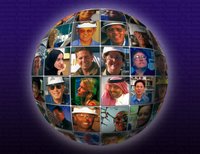Wednesday, December 13, 2006
WINTER BREAK HOURS
Tuesday, November 21, 2006
WIRELESS PRINTING and PHOTOSHOP and AUTO-CAD----OH MY!!
Laptop users can install the wireless printer using the directions posted next to the printer.
Directions are also available at the Reference and Circulation Desks, as well as in Outlook Public Folders in the Media Services folder.
Please keep in mind that Tech Support does not offer support for laptop users, nor does IT.
Students are completely on their own when installing the wireless printer. Directions are very thorough and if followed correctly, should present no problem.
Keep in mind that all student machines will print to our network printer.
At present, we do not support Mac OS printing.
There are now two PC's dedicated to Auto-Cad and PhotoShop located in the Open
Lab on the ground floor of the Library.
These machines have been installed as a result of the closing of Tech 25 on Sundays.
There is no Internet access on these machines, and students using PhoptoShop and Auto-Cad have priority over their use.
Tuesday, October 24, 2006
Cultural Awareness Week Photo Display

As part of Cultural Awareness Week - Monday October 23rd to Saturday October 28th, the Library presents:
Thursday, October 19, 2006
RESEARCH GUIDES
 Looking for help with your research paper??
Looking for help with your research paper??Wednesday, October 11, 2006
MOST RELIABLE SEARCH TOOL COULD BE YOUR LIBRARIAN
You want to learn more about Martin Luther King Jr. You might consider consulting a librarian instead of Google, AOL or Microsoft search engines.
Using the keywords "Martin Luther King," the first result on Google and AOL--whose search is powered by Google--and the second result on Microsoft Windows Live search is a Web site created by a white supremacists group that purports to provide "a true historical examination" of the civil rights leader.
Granted, there are sponsored links above the result on all three sites and a "snapshot" of links to related content on AOL above the link on that Web site. But given that many people rely on the information they get in the top few results, someone could come away with a skewed perception of the man.
That's where librarians come in. While the Web is good for offering quick results from a broad range of sources, which may or may not be trustworthy, librarians can help people get access to more authoritative information and go deeper with their research.
"There's a problem with information illiteracy among people. People find information online and don't question whether it's valid or not."
--Chris Sherman, executive editor of SearchEngineWatch.com
"There are limitations with the search engines," said Marilyn Parr, public service and collections access officer at the Library of Congress. "You can type in 'Thomas Jefferson' in any search engine and you will get thousands of hits. How do you then sort through those to find the ones that are verifiable information, authentic and not someone's personal opinion?"
Most people don't bother to look at results past the first page or spend much time evaluating the source of the material, experts say.
"There's a problem with information illiteracy among people. People find information online and don't question whether it's valid or not," said Chris Sherman, executive editor of industry blog site SearchEngineWatch.com. "I think that's where librarians are extremely important. They are trained to evaluate the quality of the information."
AOL spokesman Andrew Weinstein said the company has contacted Google about the Martin Luther King search results.
"We get all of our organic search results from Google, as you know, so we don't set the algorithms by which they are ranked," Weinstein wrote in an e-mail. "Although we can't micro-manage billions of search results, our users would not expect this to be the first result for that common search, and we do not want to promote the Web sites of hate organizations, so we have asked Google to remove this particular site from the results it provides to us."
At Google, a Web site's ranking is determined by computer algorithms using thousands of factors to calculate a page's relevance to any given query, a company representative said. The company can't tweak the results because of that automation and the need to maintain the integrity of the results, she said.
"In this particular example, the page is relevant to the query and many people have linked to it, giving it more PageRank than some of the other pages. These two factors contribute to its ranking," the representative wrote in an e-mail.
The results on Microsoft's search engine are "not an endorsement, in any way, of the viewpoints held by the owners of that content, said Justin Osmer, senior product manager for Windows Live Search.
"The ranking of our results is done in an automated manner through our algorithm which can sometimes lead to unexpected results," he said. "We always work to maintain the integrity of our results to ensure that they are not editorialized."
Search engines have added tools, like the ability to refine the search by date and source, and some offer suggestions for narrowing the search or offer shortcuts to more popular content. Some even offer academic vertical search sites, as Google Scholar and Windows Live Search do. Windows Live Search also allows users to create macros to do automated searches on their favorite Web sites. But many people either don't know about those tools or know how to use them to improve their queries.
"For some people, if the answer isn't in the first few results it might as well not be there," said Gary Price, founder and editor of the ResourceShelf blog and director of online resources at Ask.com. "No matter how smart and helpful search engines get, they're never going to replace librarians."
Search engines say the situation isn't so dire. The general public is getting more sophisticated in its search skills, said Tim Mayer, senior director of product management on Yahoo's search team.
"The amount of keywords people are entering is growing" to between two and three words, he said. "Search engine quality is improving and people are generally finding what they're looking for more often."
However, without some universal agreement on categorizing content, Web searches will always be lacking, some experts say.
"On the Web, every word is a keyword. It's such a mess," said Jason Strauss, head librarian at the Wright Institute, a graduate school of psychology in Berkeley, Calif. "When I use Google Search I almost always limit my search to the top-level domains dot-edu or dot-org. They usually have higher-quality information."
In addition, search engines also are only offering up a fraction of all the information out there. There is still the relatively untapped so-called "deep Web" of information behind corporate firewalls and password-protected Web sites. To get to the information, people have to know where the sites are and often have to pay to subscribe.
One such popular site is LexisNexis, which lets users search more than 36,000 news and public record sites, and other sources. Another is WestLaw, which provides access to legal records.
The definitive index and abstract database for psychology academics is PsycInfo, which provides access to journals, conference proceedings and other relevant information and allows users to search specific fields like "author" and "title," Strauss said. Keywords are selected by editors from a set list of terms.
"You end up with the ability to do a 'perfect search.' You get everything about the subject and nothing that is not related to it," Strauss said. "Using the Web, you are trying to think of how other people are phrasing things" to come up with keywords, which leads to mixed results, he added.
Even the federal government is addressing the Web search problem; it is trying to make it easier for citizens to track government spending. President Bush signed a bill into law this week that calls for the creation of an online database that will let people type in names of companies and states, for example, to search for government grants and contracts. The information is already on the Web, but people don't know where to find it.
A lot of people don't know that they can get access to much of the walled-off information in specialized databases for free if they have a public library card, said Price, of Ask.com and ResourceShelf.
Other helpful sites are the Librarians Internet Index, which offers quick lists of carefully vetted, reliable Web sites, the Internet Public Library and Infomine, a collection of scholarly resources on the Internet, according to Price.
With the advent of the Web and search engines, people's interaction with libraries has changed. While the number of reference questions at California public libraries has been declining, the difficulty of the questions has increased, said Ira Bray, a technology consultant at the California State Library.
Gone are the days of calling or visiting the library to find out a famous person's birthplace or the gross national product for the U.S. in 1972--you can get that in two seconds on Google. But you'll need more than a search engine to figure out, for example, what factors were at play in the growth of the U.S. economy that year, said Lee Rainie, director of the Pew Internet & American Life Project, which conducts research on the impact of the Internet on Americans.
"The idea of the 1950s librarian, that's outdated," said Sarah Houghton-Jan, information Web services manager at the San Mateo County Library in Northern California. "You find people who are expert at searching the Web and using online tools; high-level information experts instead of someone who just stamps books at the checkout desk."
Wednesday, September 27, 2006
FREE LIBRARY RESEARCH SERVICE
Thursday, September 21, 2006
What is ERES?

Electronic reserves (ERes) provides online access to course materials placed on reserve by instructors for students enrolled in their courses.
Go to the Library Homepage
Click on COURSE MATERIALS (Eres) which is listed on the left, vertical menu.
Click on Course Material
Choose Course Reserve Pages by Instructor.
Select your instructor and click grey View button.
Click the link to your course.
If prompted, enter your course page password (provided by your instructor)
Click gray accept button
Click on icons to open folders or individual course materials.
Thursday, September 14, 2006
WIRELESS IN THE LIBRARY
WI-FI SETTINGS (WIRELESS ACCESS TO THE WEB)
Students must have and install a wireless Ethernet card to access automated library information services as well as the Internet from their laptop.
Students can purchase the wireless card from the bookstore at their own expense or can go to retail electronic stores to make their purchase.
Wireless Internet access is available in most areas of the Library. If you have a problem connecting, move to the second floor counter.
The library and College IT department will not recommend any hardware or software, nor can we technically support personal laptop connectivity.
Instructions
From the Start Menu select “Settings”.
Then select “Control Panel”.
Double Click the Network” icon
Highlight TCI/IP and select “Properties”
In the TCP/IP properties box click on the IP Address tab.
Select “Obtain an IP address automatically”
Click on “OK”
Return to the desktop and double click the computer’s IE/Netscape/AO.
WIRED LAPTOP ACCESS TO THE INTERNET
Students must have a network card installed. Laptops must also have up-to-date virus scanning software, and the latest Windows patches from Microsoft. Unpatched laptops will be automatically disconnected.
Network connections are available along the balcony on the second floor of the Library, near the top of the stairs. Note that network plugs in other areas of the Library will not work.
NOTE: Be sure to plug the network cable into the laptop BEFORE you turn it on.
Instructions
From the Start Menu select “Settings”.
Select “Control Panel”
Double click the “Network” icon.
Highlight CIP/IP and select “Properties”
In the TCP/IP properties box, click on the IP Address tab.
Select “Obtain an IP address automatically".
Thursday, September 07, 2006
INSTANT MESSAGE A LIBRARIAN RETURNS!!
Tuesday, August 01, 2006
Why You Should Fall on your Knees and Worship a Librarian
 The following is from LibrarianAvengers.org
The following is from LibrarianAvengers.orgOk, sure. We’ve all got our little preconceived notions about who librarians are and what they do. Many people think of librarians as scuttling about "Sssh-ing" people and stamping things. Well, think again buster.
Librarians have degrees. They go to graduate school for Information Science and become masters of data systems and human/computer interaction. Librarians can catalog anything from an onion to a dog’s ear. They could catalog you.
Librarians wield unfathomable power. With a flip of the wrist they can hide your dissertation behind piles of old Field and Stream magazines. They can find data for your term paper that you never knew existed. They may even point you toward new and appropriate subject headings.
People become librarians because they know too much. Their knowledge extends beyond mere categories. They cannot be confined to disciplines. Librarians are all-knowing and all-seeing. They bring order to chaos. They bring wisdom and culture to the masses. They preserve every aspect of human knowledge. Librarians rule. And they will kick the crap out of anyone who says otherwise.
Monday, July 31, 2006
GOOGLE AND SHAKESPEARE

ACADEMY AWARD DVD'S

If you missed any of this year's Academy Award nominated films and winners, come to the Library to watch or take home to watch:
- Good Night and Good Luck - DVD 1305
- The Squid and the Whale - DVD 1302
- Memoirs of a Geisha - DVD 1255
- Crash - DVD 1200
- Hotel Rowanda - DVD 972
- A History of Violence - DVD 1304
- The Aviator - DVD 1372
Thursday, June 29, 2006
RENEW BOOKS ONLINE
Monday, June 19, 2006
E BOOKS
- Go to the Library homepage.
- Click on Search WCC catalog
- In ther first search box, type in your topic or subject
- Scroll down to Limit by collection and choose ELECTRONIC RESOURCES
- Read your book or book chapters online.
Wednesday, June 14, 2006
EMBEDDED LIBRARIAN
For additional information, please contact your librarian liaison or Sandy Schepis at x6629.

